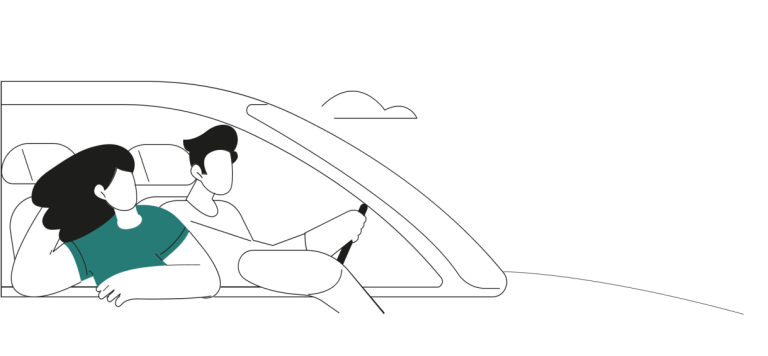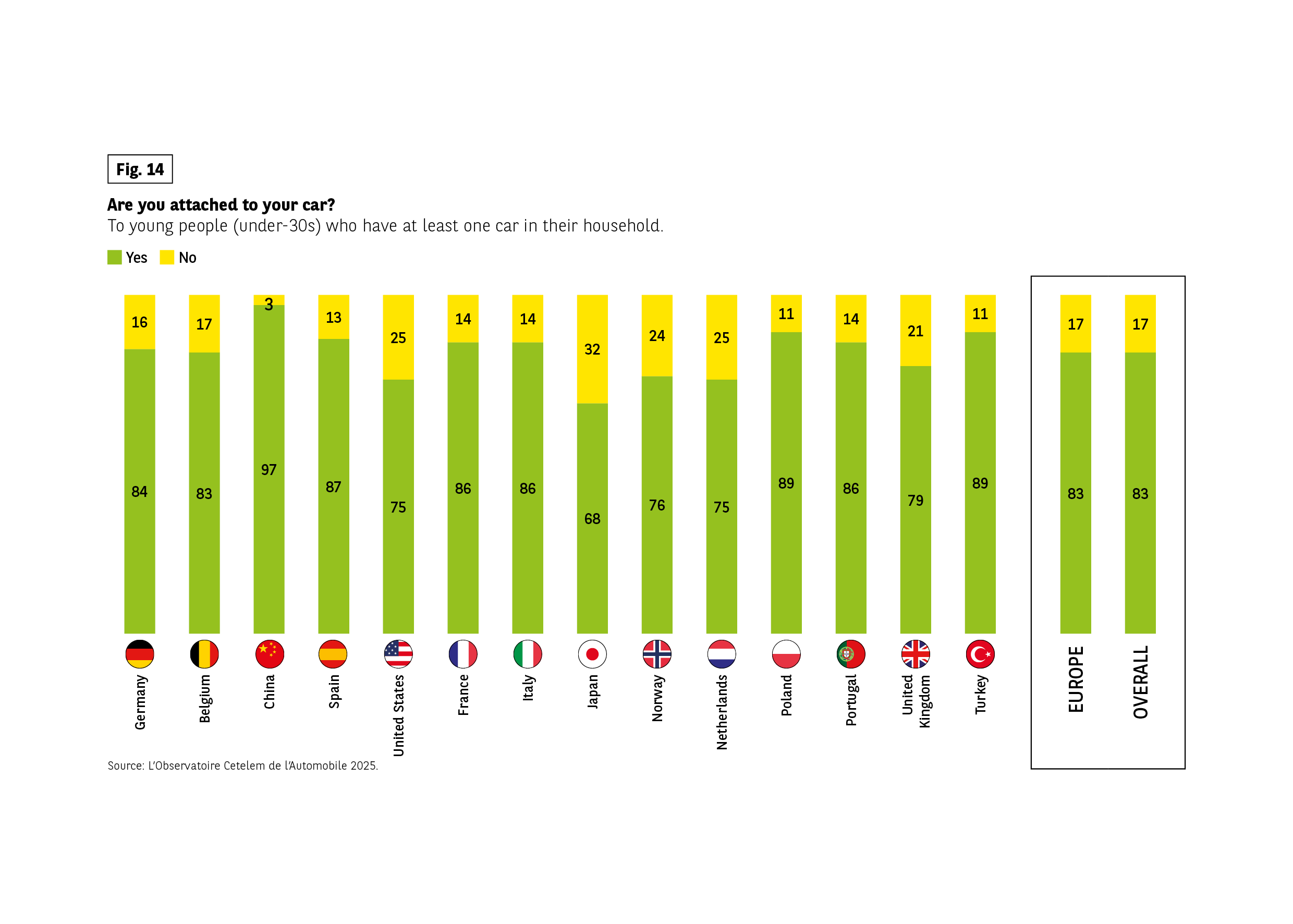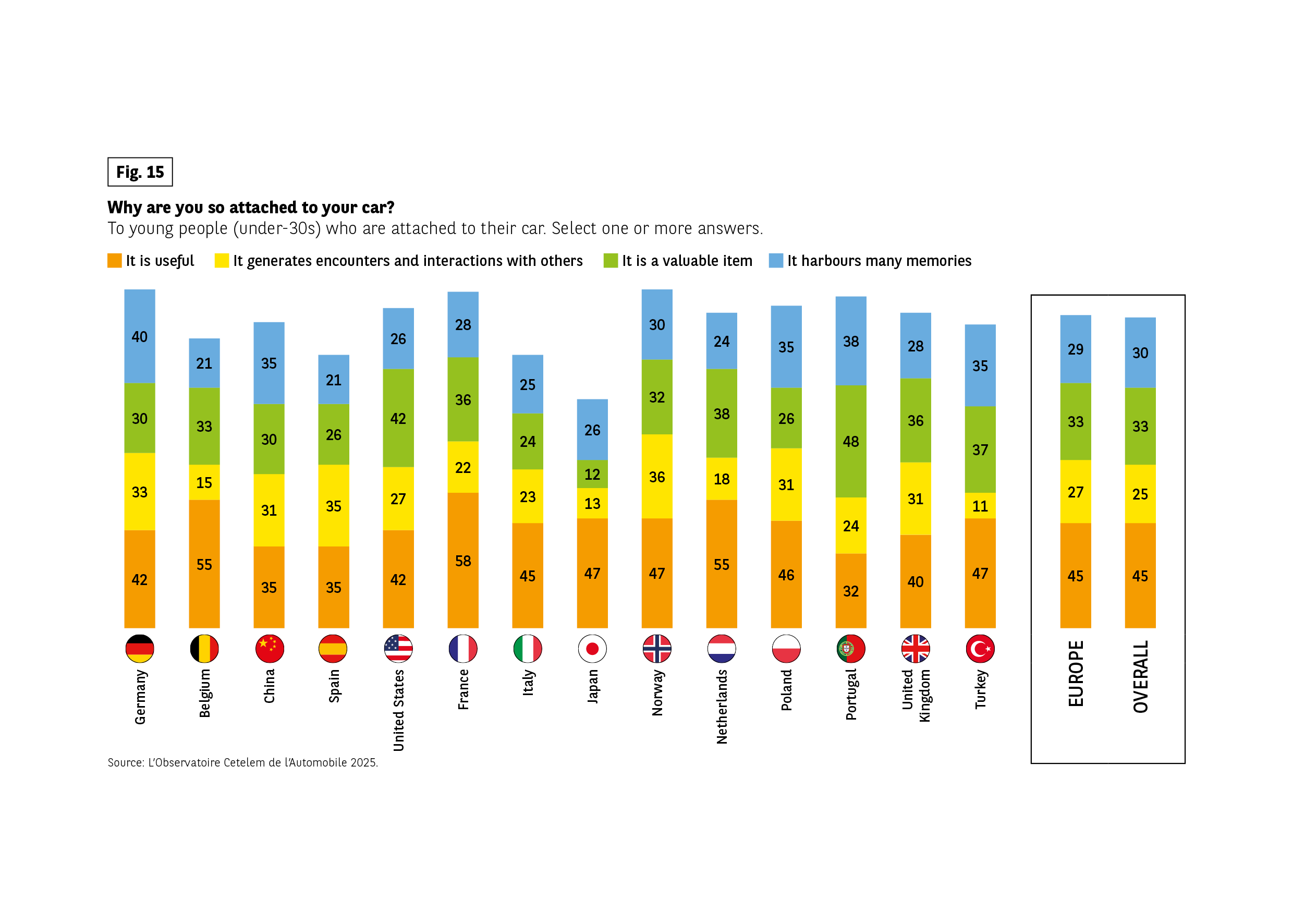A sentimental relationship


Movies like Christine, Crash, Titane and Rebel Without a Cause have taught us that human beings can develop a close and unique relationship with their car, whose status is sometimes elevated to that of a living, breathing being. Without taking things quite so far, young people are of the view that this is not a consumer product like any other. Conveying values and emotions, while conjuring memories and a sense of freedom, cars inhabit a world in which reason and feelings are engaged in continuous dialogue, with brands acting as key advisors and confidants.
A STRONG ATTACHMENT TO CARS
Although cars can be viewed as simple consumer products, what sets them apart is the relationship their owners have with them. This relationship almost equips them with a personality of their own.
In turn, this can generate a special attachment. Within the youngest demographic, this is true in 8 out of 10 cases (Fig. 14). In China, what we see is a veritable love affair, with a colossal 97% of young people saying they are attached to their car. The Turks, Poles and Italians are almost as enthusiastic, while in the land of cycling, the Dutch are relatively more measured in their feelings (70%). Inhabitants of big cities also harbour a passion for motoring, as do couples with children.
Fig 14 – Attachment of young people to their car, by country
Download this infographic for your presentations The infographic presents the responses to the question: “Are you attached to your car?”, asked to young people under 30 years old who have at least one car in their household. Two answers are possible: “yes” and “no”. The results are compared between several countries, as well as at the “Europe” and “Overall” levels.
The data indicated are:
Germany: yes 84%, no 16%
Belgium: yes 83%, no 17%
China: yes 97%, no 3%
Spain: yes 87%, no 13%
United States: yes 75%, no 25%
France: yes 86%, no 14%
Italy: yes 86%, no 14%
Japan: yes 68%, no 32%
Norway: yes 76%, no 24%
Netherlands: yes 75%, no 25%
Poland: yes 89%, no 11%
Portugal: yes 86%, no 14%
United Kingdom: yes 79%, no 21%
Turkey: yes 89%, no 11%
Europe (average): yes 83%, no 17%
Overall (all countries): yes 83%, no 17%
Overall, the vast majority of young people surveyed declare that they are attached to their car, with particularly high levels in several European countries and in China. Japan has the lowest attachment level in the panel, while other countries range between 75% and nearly 90%.
Source: Cetelem Automobile Observatory 2025
The infographic presents the responses to the question: “Are you attached to your car?”, asked to young people under 30 years old who have at least one car in their household. Two answers are possible: “yes” and “no”. The results are compared between several countries, as well as at the “Europe” and “Overall” levels.
The data indicated are:
Germany: yes 84%, no 16%
Belgium: yes 83%, no 17%
China: yes 97%, no 3%
Spain: yes 87%, no 13%
United States: yes 75%, no 25%
France: yes 86%, no 14%
Italy: yes 86%, no 14%
Japan: yes 68%, no 32%
Norway: yes 76%, no 24%
Netherlands: yes 75%, no 25%
Poland: yes 89%, no 11%
Portugal: yes 86%, no 14%
United Kingdom: yes 79%, no 21%
Turkey: yes 89%, no 11%
Europe (average): yes 83%, no 17%
Overall (all countries): yes 83%, no 17%
Overall, the vast majority of young people surveyed declare that they are attached to their car, with particularly high levels in several European countries and in China. Japan has the lowest attachment level in the panel, while other countries range between 75% and nearly 90%.
Source: Cetelem Automobile Observatory 2025
CARS HELP CREATE FUTURE MEMORIES
However, this attachment is not just sentimental. For 45% of young people, the feeling stems primarily from the utility of cars, a viewpoint most commonly held by rationally-minded French motorists (58%), in contrast to the more romantic Portuguese (32%).
Cars also appeal to people’s materialistic side, with 33% of young people regarding them as valuable items. The Portuguese and Americans are the most likely to be in this camp (48% and 42%), while the Japanese are overwhelmingly unmoved in this respect (12%). We’ve known since Back to the Future that cars can be wonderful time machines. The NextGen are unlikely to mock boomers for their views on the subject. 30% of them believe they are the perfect tool for forging memories, which suggests that cars have a bright future. These are memories created by holidays, excursions with family or friends, and outings with one’s first child. The Germans and, once again, the Portuguese are eagerly looking ahead to these automotive memories.
In last place when it comes to sources of attachment is the ability of cars to generate fresh encounters and interactions with others (25 %) (Fig. 15).
Fig 15 – Reasons for attachment to the car among young people
Download this infographic for your presentations The infographic presents the responses to the question: “Why are you attached to your car?”, asked to young people under 30 years old who are attached to their vehicle. Several answers were possible: “it provides service”, “it facilitates meetings and exchanges”, “it’s an object of value”, and “you have many memories with it”. The results are compared between several countries, as well as at the “Europe” and “Overall” levels.
The data indicated are:
Germany: provides service 42%, facilitates meetings 33%, object of value 30%, memories 40%
Belgium: provides service 55%, facilitates meetings 15%, object of value 33%, memories 21%
China: provides service 35%, facilitates meetings 31%, object of value 30%, memories 35%
Spain: provides service 35%, facilitates meetings 35%, object of value 26%, memories 21%
United States: provides service 42%, facilitates meetings 27%, object of value 42%, memories 26%
France: provides service 45%, facilitates meetings 22%, object of value 36%, memories 28%
Italy: provides service 45%, facilitates meetings 23%, object of value 24%, memories 25%
Japan: provides service 47%, facilitates meetings 13%, object of value 12%, memories 26%
Norway: provides service 55%, facilitates meetings 18%, object of value 36%, memories 24%
Netherlands: provides service 46%, facilitates meetings 31%, object of value 38%, memories 35%
Poland: provides service 32%, facilitates meetings 24%, object of value 48%, memories 38%
Portugal: provides service 40%, facilitates meetings 31%, object of value 36%, memories 28%
United Kingdom: provides service 47%, facilitates meetings 31%, object of value 37%, memories 35%
Turkey: provides service 45%, facilitates meetings 25%, object of value 33%, memories 30%
Europe (average): provides service 45%, facilitates meetings 27%, object of value 33%, memories 29%
Overall (all countries): provides service 45%, facilitates meetings 25%, object of value 33%, memories 30%
Overall, the service provided by the car appears as the most frequently cited motivation in most countries. Memories are also an important reason, while the symbolic value of the car and its role in meetings vary more from one country to another.
Source: Cetelem Automobile Observatory 2025
The infographic presents the responses to the question: “Why are you attached to your car?”, asked to young people under 30 years old who are attached to their vehicle. Several answers were possible: “it provides service”, “it facilitates meetings and exchanges”, “it’s an object of value”, and “you have many memories with it”. The results are compared between several countries, as well as at the “Europe” and “Overall” levels.
The data indicated are:
Germany: provides service 42%, facilitates meetings 33%, object of value 30%, memories 40%
Belgium: provides service 55%, facilitates meetings 15%, object of value 33%, memories 21%
China: provides service 35%, facilitates meetings 31%, object of value 30%, memories 35%
Spain: provides service 35%, facilitates meetings 35%, object of value 26%, memories 21%
United States: provides service 42%, facilitates meetings 27%, object of value 42%, memories 26%
France: provides service 45%, facilitates meetings 22%, object of value 36%, memories 28%
Italy: provides service 45%, facilitates meetings 23%, object of value 24%, memories 25%
Japan: provides service 47%, facilitates meetings 13%, object of value 12%, memories 26%
Norway: provides service 55%, facilitates meetings 18%, object of value 36%, memories 24%
Netherlands: provides service 46%, facilitates meetings 31%, object of value 38%, memories 35%
Poland: provides service 32%, facilitates meetings 24%, object of value 48%, memories 38%
Portugal: provides service 40%, facilitates meetings 31%, object of value 36%, memories 28%
United Kingdom: provides service 47%, facilitates meetings 31%, object of value 37%, memories 35%
Turkey: provides service 45%, facilitates meetings 25%, object of value 33%, memories 30%
Europe (average): provides service 45%, facilitates meetings 27%, object of value 33%, memories 29%
Overall (all countries): provides service 45%, facilitates meetings 25%, object of value 33%, memories 30%
Overall, the service provided by the car appears as the most frequently cited motivation in most countries. Memories are also an important reason, while the symbolic value of the car and its role in meetings vary more from one country to another.
Source: Cetelem Automobile Observatory 2025
